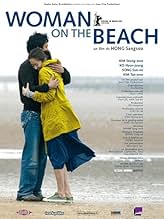NOTE IMDb
6,8/10
1,5 k
MA NOTE
Un réalisateur fait venir un ami à la plage sous le prétexte d'écrire un scénario. Il entame alors une liaison avec la petite amie de celui-ci.Un réalisateur fait venir un ami à la plage sous le prétexte d'écrire un scénario. Il entame alors une liaison avec la petite amie de celui-ci.Un réalisateur fait venir un ami à la plage sous le prétexte d'écrire un scénario. Il entame alors une liaison avec la petite amie de celui-ci.
- Récompenses
- 8 victoires et 7 nominations au total
Avis à la une
Where Hong Sang-soo's dramas differ from Eric Rohmer's, other than all the ways that come with being Korean not French, is notably in the egotism mitigated by irony of having one the main characters in his movies often happen to be a handsome, hunky famous director. In this one it's a "Director Kim," as he's respectfully addressed (Kim Joong-rae, played by Kim Seung-woo) who goes to the somewhat sterile environment of the semi-deserted Shinduri beach resort on Korea's west coast with his production designer, Won Chang-wook (Kim Tae-woo) in hopes of ending a creative block and penning the treatment for his next film. Won brings along a girlfriend, composer Kim Moon-sook (Ko Hyun-joung, a former TV star) and competition gets blatantly going when Director Kim takes Moon-sook aside and frankly says he's interested in her and asks her whether she'd prefer him over the designer, given a free choice.
The blatancy of Joong-rae's authority is underlined by his being older, better-looking, physically bigger and stronger-looking, and possessed of a deeper voice. In comparison Won's a mild, slightly nerdy fellow. But despite that, Joong-rae's not an out-and-out winner. He's comically chauvinistic in the way he damns the lady's music with faint praise. And in the time that follows he proves to be neurotic and indecisive, stuffing his hands in his jeans and wiggling around on his legs with comic unease. Moon-sook's dating men when living in Germany he admits is a turn-on for temporary dating, but the opposite for a long-term relationship. He has a serious hangup about mating with a woman who's experienced. Like a good Eric Rohmer character, he hesitates and they discuss. Moon-sook winds up saying that he's wonderful to her as a director, but in other ways just "a typical Korean man." Hong's stories often refer to sex and show couples in bed, but they aren't erotic and characters rarely go all the way. Kim and Moon-sook do however begin with some long kisses on the beach that evening.
At another point Director Kim has a violent outburst of anger at a restaurant the trio enters because the owners are half asleep when they come in, and Chang-wook gets equally over-the-top in anger over the injustice of this and insists Kim must apologize. This seems random, except to show that both men have little control over their male egos, and tend to flail about, while the lady remains cool and composed.
In spite of all this Moon-sook becomes fascinated with Kim and they spent a night in an empty hotel room, but the next day Kim says it's too quiet for him to work and they all leave Shinduri. Two days later Kim's back on his own though, and leaves a phone message with Moon-sook, regretting his indecisiveness. He "interviews" a woman he runs into who "reminds" him of Moon-sook and takes her up to the same room he was in two nights earlier. Things get complicated when Moon-sook herself reappears and has a drunken emotional outburst outside the room. The new woman eventually feels hurt and abandoned too. In the midst of all this there's a cute dog that gets abandoned by a mysterious couple, and Director Kim pulls an "unused muscle" and is temporarily disabled. Lots of snacking and drinking to a drunken state accompanies all these developments. By himself and with his leg semi-paralyzed Kim somehow turns out the film treatment. The relationships seem unresolved, but Moon-sook is by herself at the end leaving Shinduri again in her little car, which symbolically gets stuck in the sand and then gets out again so she can drive off on her own, free.
Woman on the Beach differs from previous Hong films in presenting its few main characters in the relative isolation of this new, somewhat drab resort during a cold spring season. The atmosphere is well used and the scenes are vivid. This film of Hong's is perhaps even more inconclusive than most, and a bit long, but the rhythms of the conversations and the clarity of the blocking and editing arouse one's admiration and this, like all Hong's films, is original and watchable and will not disappoint his fans which include the selection committee of the Film Society of Lincoln Center: they've been choosing his latest film as one of the NYFF's primary offerings every year for three years in a row. It's also true that Hong's improvisational way of working always results in fluid, convincing performances by his actors.
The blatancy of Joong-rae's authority is underlined by his being older, better-looking, physically bigger and stronger-looking, and possessed of a deeper voice. In comparison Won's a mild, slightly nerdy fellow. But despite that, Joong-rae's not an out-and-out winner. He's comically chauvinistic in the way he damns the lady's music with faint praise. And in the time that follows he proves to be neurotic and indecisive, stuffing his hands in his jeans and wiggling around on his legs with comic unease. Moon-sook's dating men when living in Germany he admits is a turn-on for temporary dating, but the opposite for a long-term relationship. He has a serious hangup about mating with a woman who's experienced. Like a good Eric Rohmer character, he hesitates and they discuss. Moon-sook winds up saying that he's wonderful to her as a director, but in other ways just "a typical Korean man." Hong's stories often refer to sex and show couples in bed, but they aren't erotic and characters rarely go all the way. Kim and Moon-sook do however begin with some long kisses on the beach that evening.
At another point Director Kim has a violent outburst of anger at a restaurant the trio enters because the owners are half asleep when they come in, and Chang-wook gets equally over-the-top in anger over the injustice of this and insists Kim must apologize. This seems random, except to show that both men have little control over their male egos, and tend to flail about, while the lady remains cool and composed.
In spite of all this Moon-sook becomes fascinated with Kim and they spent a night in an empty hotel room, but the next day Kim says it's too quiet for him to work and they all leave Shinduri. Two days later Kim's back on his own though, and leaves a phone message with Moon-sook, regretting his indecisiveness. He "interviews" a woman he runs into who "reminds" him of Moon-sook and takes her up to the same room he was in two nights earlier. Things get complicated when Moon-sook herself reappears and has a drunken emotional outburst outside the room. The new woman eventually feels hurt and abandoned too. In the midst of all this there's a cute dog that gets abandoned by a mysterious couple, and Director Kim pulls an "unused muscle" and is temporarily disabled. Lots of snacking and drinking to a drunken state accompanies all these developments. By himself and with his leg semi-paralyzed Kim somehow turns out the film treatment. The relationships seem unresolved, but Moon-sook is by herself at the end leaving Shinduri again in her little car, which symbolically gets stuck in the sand and then gets out again so she can drive off on her own, free.
Woman on the Beach differs from previous Hong films in presenting its few main characters in the relative isolation of this new, somewhat drab resort during a cold spring season. The atmosphere is well used and the scenes are vivid. This film of Hong's is perhaps even more inconclusive than most, and a bit long, but the rhythms of the conversations and the clarity of the blocking and editing arouse one's admiration and this, like all Hong's films, is original and watchable and will not disappoint his fans which include the selection committee of the Film Society of Lincoln Center: they've been choosing his latest film as one of the NYFF's primary offerings every year for three years in a row. It's also true that Hong's improvisational way of working always results in fluid, convincing performances by his actors.
Needing a quiet, relaxing environment in which to complete the script for his latest film, well-known director Kim Jung-rae heads to a largely deserted seaside resort with his friend, Won Chang-wook, and Won's beautiful girlfriend, Kim Mun-suk. Tensions quickly develop when Kim and Mun-suk become romantically involved with one another, leaving the erstwhile Won as essentially odd-man-out. Yet, terrified of making any kind of long term commitment, Kim backs away from Mun-suk at a crucial moment, causing a serious rupture in their relationship. It's only after a second woman comes into the picture that Mun-suk returns to the beach town, further complicating Kim's already complicated life - though providing possible fodder for the script he's having such a hard time completing.
Slow-moving, episodic and hypnotic, the Korean drama "Woman on the Beach" is wonderfully perceptive about human nature and the multi-faceted and complex ways in which people relate to one another. It's virtually impossible to pigeonhole any of the characters since they often act and react in ways that surprise and intrigue us. Director Sang-soo Hong relies largely on extended conversations to tell his story, an approach which allows the drama to unfold in a thoroughly naturalistic fashion, without having to resort to melodrama or contrivance to get its points across. To that end, the movie is filled with numerous seemingly irrelevant, off-the-cuff moments (including the final scene) that add immeasurably to the verisimilitude of the piece. As a result, every moment in the film feels unscripted and real, an illusion greatly enhanced by the excellent performances of Seung-woo Kim, Hyun-jung Go, Seon-mi Song and Tae-woo Kim.
Finally, the shuttered hotels and sparsely populated beaches and boardwalks provide an eerily appropriate backdrop for this tale of an individual so haunted by the demons and ghosts of his own past that he finds it difficult to live in the present.
Slow-moving, episodic and hypnotic, the Korean drama "Woman on the Beach" is wonderfully perceptive about human nature and the multi-faceted and complex ways in which people relate to one another. It's virtually impossible to pigeonhole any of the characters since they often act and react in ways that surprise and intrigue us. Director Sang-soo Hong relies largely on extended conversations to tell his story, an approach which allows the drama to unfold in a thoroughly naturalistic fashion, without having to resort to melodrama or contrivance to get its points across. To that end, the movie is filled with numerous seemingly irrelevant, off-the-cuff moments (including the final scene) that add immeasurably to the verisimilitude of the piece. As a result, every moment in the film feels unscripted and real, an illusion greatly enhanced by the excellent performances of Seung-woo Kim, Hyun-jung Go, Seon-mi Song and Tae-woo Kim.
Finally, the shuttered hotels and sparsely populated beaches and boardwalks provide an eerily appropriate backdrop for this tale of an individual so haunted by the demons and ghosts of his own past that he finds it difficult to live in the present.
I confess to not having seen any of this director's films, but on the basis of this, I probably won't bother. This is the story of a writer/director with writers block who basically treats women like garbage so he can find his muse and regain his creativity. Actually, he treats just about everyone in this film like garbage.I guess it is hero worship, because I couldn't understand why these seemingly intelligent women would fall for this fairly obnoxious, boorish individual. Set on a resort beach in Korea seemingly out of season, there is very little to do, so the lead character becomes mean to everyone around him. Perhaps the maker of this film felt the point was that there are two kinds of people, those who give and those who take. The two women the lead character spends time with are pathetic. I had high hopes for the character Moonsook, who in the beginning showed promise. She should have been a stronger character. The director keeps calling her very pretty/beautiful (see is pretty, but not beautiful), but then he treats her like dirt, calling her stupid twice. He gives writers a bad name. If the filmmaker's idea was to assuage some guilt he himself has, fine. He should have made a better film. This film is full of forced, vacuous dialog. I know I'll probably be in the minority on the opinion on this film, but I am a big Asian film fan and this one left me cold. Many times I pondered leaving the theater. In the audience of about 20 people there were maybe three chuckles from the dialog. I'd like to see the actress who plays Moonsook in another role. She probably is a good actress, but her character is useless. I shook my head a little at the people who were waiting in line for the next showing. If you're a fan of this filmmaker, maybe you're used to his kind of storytelling. I wanted to like it, and the reviews were mostly favorable. Mine isn't, regrettably.
Sometimes a Korean film really grabs me, like Il Mare, which was remade into The Lake House. It was a beautifully romantic film; just what this wasn't.
The dialog throughout was superficial and boring. It never really rose above the level you would expect in a bar or nightclub.
Superficial is a good term to describe Director Kim Jung-rae (Seung-woo Kim). he was really self-conscious and a bit misogynist. He was only interesting in bedding whomever he could; not in anything resembling a relationship.
After he had Kim Mun-Suk (Hyun-jung Go) he was ready to move on and get rid of her. He immediately started looking for someone that looked like her (Seon-mi Song) to bed.
It was a big disappointment, and, for a comedy, it wasn't even funny.
The dialog throughout was superficial and boring. It never really rose above the level you would expect in a bar or nightclub.
Superficial is a good term to describe Director Kim Jung-rae (Seung-woo Kim). he was really self-conscious and a bit misogynist. He was only interesting in bedding whomever he could; not in anything resembling a relationship.
After he had Kim Mun-Suk (Hyun-jung Go) he was ready to move on and get rid of her. He immediately started looking for someone that looked like her (Seon-mi Song) to bed.
It was a big disappointment, and, for a comedy, it wasn't even funny.
A film director with writer's block leaves the city of Seoul to finish his script at a Korean seaside resort. An entanglement with two women, however, reveals his inner confusion and forces him to confront his self-defeating behavior. Hong Sang-soo's latest, Woman on the Beach, is a comedy drama about love and the complications that develop in relationships when one partner is less than candid with the other. Like the films of Eric Rohmer, Woman on the Beach is simple on the surface yet explores a deeper layer of complexity in human relationships that is insightful and revealing.
As the film opens, director Joong-rae (Kim Seung-woo) travels to Shinduri Beach on Korea's West Coast hoping to renew his inspiration. He brings along his production designer Chang-wook (Kim Tae-woo) and Chang-wook's girl friend Moon-sook (Ko Hyeon-geong), a composer of popular songs. It becomes clear almost immediately that Moon-sook is enamored with the director and the two soon sneak away from Chang-wook and find an empty hotel room where they exchange vows of love. On the surface, she is a strong, independent woman, while Joon-rae gives the appearance of a calm and confident artist, yet both are rebounding from previous relationships and are very vulnerable.
When the morning comes, Joong-rae's warm emotions of the previous night have turned chilly. Unable to confront the feelings that reminded him of his failed marriage, he feigns anxiety and asks to be driven back to the city, leaving a phone message for Moon-sook. When he returns to the seaside after a few days, on the pretense of asking for an interview for his film, he meets Sun-hee (Song Seon-mi) who resembles Moon-sook. They spend the afternoon and night together, exchanging vows of affection, similar to those given to Moon-sook.
When Moon-sook comes looking for him in a drunken rage, however, he has to confront his deceptions and the tangled web he was woven. Woman on the Beach is a thoroughly engaging film with sparkling dialogue, complex characters, and outstanding performances from the lead actors. If it leaves us with a touch of sadness about people's inability to connect, it also leaves us smiling about their resilience and capacity for joy. Though Hong's characters are flawed, we identify with their weakness because they are all too human and may even reflect our own failings.
As the film opens, director Joong-rae (Kim Seung-woo) travels to Shinduri Beach on Korea's West Coast hoping to renew his inspiration. He brings along his production designer Chang-wook (Kim Tae-woo) and Chang-wook's girl friend Moon-sook (Ko Hyeon-geong), a composer of popular songs. It becomes clear almost immediately that Moon-sook is enamored with the director and the two soon sneak away from Chang-wook and find an empty hotel room where they exchange vows of love. On the surface, she is a strong, independent woman, while Joon-rae gives the appearance of a calm and confident artist, yet both are rebounding from previous relationships and are very vulnerable.
When the morning comes, Joong-rae's warm emotions of the previous night have turned chilly. Unable to confront the feelings that reminded him of his failed marriage, he feigns anxiety and asks to be driven back to the city, leaving a phone message for Moon-sook. When he returns to the seaside after a few days, on the pretense of asking for an interview for his film, he meets Sun-hee (Song Seon-mi) who resembles Moon-sook. They spend the afternoon and night together, exchanging vows of affection, similar to those given to Moon-sook.
When Moon-sook comes looking for him in a drunken rage, however, he has to confront his deceptions and the tangled web he was woven. Woman on the Beach is a thoroughly engaging film with sparkling dialogue, complex characters, and outstanding performances from the lead actors. If it leaves us with a touch of sadness about people's inability to connect, it also leaves us smiling about their resilience and capacity for joy. Though Hong's characters are flawed, we identify with their weakness because they are all too human and may even reflect our own failings.
Le saviez-vous
- ConnexionsFeatured in Ebert Presents: At the Movies: Épisode #1.21 (2011)
Meilleurs choix
Connectez-vous pour évaluer et suivre la liste de favoris afin de recevoir des recommandations personnalisées
Détails
- Date de sortie
- Pays d’origine
- Sites officiels
- Langue
- Aussi connu sous le nom de
- Mujer en la playa
- Lieux de tournage
- Sociétés de production
- Voir plus de crédits d'entreprise sur IMDbPro
Box-office
- Montant brut aux États-Unis et au Canada
- 23 686 $US
- Week-end de sortie aux États-Unis et au Canada
- 4 250 $US
- 13 janv. 2008
- Montant brut mondial
- 813 813 $US
- Durée
- 2h 7min(127 min)
- Couleur
- Mixage
- Rapport de forme
- 1.85 : 1
Contribuer à cette page
Suggérer une modification ou ajouter du contenu manquant














